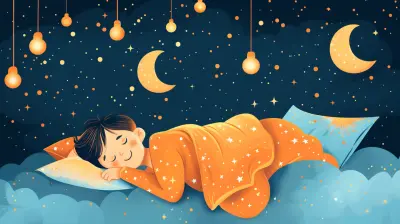How to Communicate Expectations Clearly with Younger Kids
4 February 2025
Parenting is no walk in the park, is it? One of the trickiest parts of raising little humans is figuring out how to communicate expectations clearly. Let’s be real—kids aren’t mind readers. Sometimes it feels like you’re speaking an entirely different language! But, the good news is, with the right techniques, you can bridge that gap. So, grab a cup of coffee, settle in, and let me walk you through how you can set your expectations in a way that leaves both you and your kids feeling like you're on the same team.
Why Communicating Expectations Matters
First, let’s take a step back. Why is communicating expectations so important? Kids thrive on structure and clarity. They’re like little explorers trying to navigate an unfamiliar world, and your words and actions are their map. When expectations are unclear, they get frustrated. And let’s be honest—so do we!Think of it this way: imagine playing a board game without knowing the rules. Frustrating, right? That’s how kids feel when they don’t know what’s expected of them. Clear expectations don’t just make life easier for parents—it also boosts kids' confidence because they know what’s coming next.
Common Challenges in Communicating Expectations
Before we dive into the how-tos, let’s talk about what typically gets in the way of clear communication. Recognizing these roadblocks can help you avoid them.1. Ambiguity
You might say, "Be good during dinner," but what does "good" mean? Staying seated? Not shouting? Eating all their food? Kids need specifics, not vague guidelines.2. Inconsistency
Ever changed your expectations midway? I’m guilty of this too. If one day jumping on the couch is fine but the next day it’s not, kids get confused. Consistency is key.3. Not Matching Age-Appropriate Language
Talking to a 3-year-old the same way you’d talk to a 10-year-old rarely works. Little ones need simpler, more concrete instructions.4. Overloading with Information
Ever tried to give five instructions at once? Most kids will zone out after the first one. Keep it simple and actionable.
Strategies to Clearly Communicate Expectations
Alright, so how do we get this right? Here are some tried-and-true strategies that can help you and your little one get on the same page.1. Be Specific, Not Vague
Forget blanket statements like "Behave yourself." Instead, use concrete actions. For example, if you want your child to sit still during dinner, say, “Please keep your bottom on the chair until dinner is over.”Think of it as giving step-by-step directions. The more specific you are, the less room there is for misunderstanding.
2. Use Positive Language
Kids respond better to positive instructions than negative ones. Instead of saying, “Don’t run in the house,” try saying, “Please walk when you’re inside.” Positive phrasing focuses on what they should do rather than what they shouldn’t.Why does this work? It’s a mindset thing. When kids hear “don’t run,” many just latch onto the “run” part and do exactly what you don’t want. Positive language flips that script.
3. Get Down to Their Level
This one’s a biggie. Physically lowering yourself to your child’s eye level makes a huge difference. It shows them you’re serious and helps you connect better. Plus, it’s way less intimidating than getting barked at from above.While you're down there, make eye contact. It’s a small but powerful way to ensure they’re really listening.
4. Use Age-Appropriate Language
Younger kids process information differently than older ones. For toddlers, keep sentences short and simple, like, “Time to clean up toys.” As they grow, you can add more detail, but still keep it straightforward.Pro tip? Avoid sarcasm or idioms—they go right over little heads. If you say, “Cut it out,” your 4-year-old might genuinely ask, “Cut what?”
5. Turn Expectations into Collaborations
Ever noticed the magic word “we”? Instead of saying, “You need to pick up your toys,” try saying, “Let’s clean up together.” Suddenly, it feels less like an order and more like teamwork.Giving kids a voice also helps. Instead of declaring, “Bedtime is in five minutes,” you could say, “Would you like to go to bed in five minutes or ten minutes?” (Sneaky, I know. Both options end in bedtime, but it makes them feel like they’re in control!)
6. Explain the "Why"
Kids—like adults—are more likely to follow expectations if they understand the reason behind them. Instead of saying, “Don’t touch the stove,” explain, “The stove is hot, and it could hurt you.”Explanations build trust. They show your child that you’re not just making up rules for the fun of it—there’s a reason behind them.
7. Set Consequences (and Stick to Them)
Let’s face it, kids will test boundaries—it’s in their nature. That’s why it’s essential to outline consequences ahead of time. If screen time ends at 7 p.m. and they keep begging for "just five more minutes," calmly remind them of the rule.Remember, consistency is your superpower here. Empty threats don’t work. If you say there’s no dessert if toys aren’t cleaned up and then give them dessert anyway, they’ll stop taking you seriously.
8. Reinforce Expectations Through Repetition
Ever feel like a broken record? That’s parenting for you! Kids need to hear things multiple times before they fully grasp them. Don’t be afraid to repeat yourself. Just switch up how you say it so it doesn’t feel like nagging.For example, instead of repeating, “Brush your teeth,” 10 times, try saying, “What’s the next step in our bedtime routine?” This gets them involved and reminds them of your expectations without feeling pushy.
9. Praise and Acknowledge Efforts
Let’s not forget the power of positive reinforcement. A quick “Great job listening!” or “I love how you kept your hands to yourself at the store” goes a long way. Kids crave approval, and praising their efforts encourages them to keep meeting your expectations.
Real-Life Examples of Clear Communication
Still wondering what setting clear expectations looks like in action? Here are a few examples you can use in daily life:1. Morning Routine
- Instead of: "Get ready for school."
- Say: "Please get dressed, brush your teeth, and pack your backpack for school."
2. Playtime
- Instead of: "Don't make a mess."
- Say: "Let’s keep all the playdough on this tray so it doesn’t get on the carpet."
3. Dinner Time
- Instead of: "Stop being naughty at the table."
- Say: "Remember, we sit on our chairs and use our quiet voices while eating."
When Things Go Off Track
Now, let’s be honest: kids won’t always follow through, no matter how clear you are. What do you do then?- Stay Calm: Yelling won’t help (although it’s tempting!). Take a deep breath and re-state the expectation calmly.
- Offer a Do-Over: Everyone makes mistakes. Give your child the chance to try again.
- Follow Through: If consequences were set, enforce them—kindly but firmly.
The Long-Term Payoff
Here’s the thing—communicating expectations clearly isn’t just about surviving the day-to-day. It’s about building a foundation of trust, respect, and understanding. Over time, your kids will learn to anticipate what’s expected of them, and you’ll spend less time repeating yourself (hallelujah!).And while it takes effort upfront, the investment pays off when your home feels more peaceful and your connection with your kids grows stronger.
Final Thoughts
Parenting is all about progress, not perfection. Communicating expectations clearly is a skill that takes practice, and you won’t get it right 100% of the time. But that’s okay—you’re human, and so are your kids.Remember, it’s not just about what you say—it’s how you say it, when you say it, and why you say it. So, take each day as it comes, and know that every little effort you make is helping your kids grow into confident, communicative, and capable humans. You've got this!
all images in this post were generated using AI tools
Category:
Communication With KidsAuthor:

Kelly Snow
Discussion
rate this article
13 comments
Zevin Martinez
This article sparks my curiosity! How do we balance clarity with creativity when communicating expectations to younger kids? I'm intrigued by techniques that can make this process not only effective but also engaging and fun for both parents and children. Can't wait to explore these ideas further!
March 29, 2025 at 3:46 AM

Kelly Snow
I'm glad you found the article intriguing! Balancing clarity and creativity involves using simple language, visual aids, and playful activities to make expectations engaging. Techniques like storytelling, role-playing, and using songs can significantly enhance understanding while keeping the process fun for both parents and kids. Excited for you to explore these ideas further!
Wyatt Soto
Clear communication is vital in parenting. Setting simple, age-appropriate expectations helps children understand boundaries while fostering their independence. Consistency and patience are key to success.
March 20, 2025 at 5:32 AM

Kelly Snow
Absolutely, clear communication and consistent expectations empower children to thrive and develop independence. Thank you for sharing these valuable insights!
Lena Brown
What a thoughtful approach to discussing communication! I'm curious about the techniques mentioned—how can we ensure our little ones truly understand expectations while still feeling empowered? Excited to learn more from your insights!
March 14, 2025 at 4:55 PM

Kelly Snow
Thank you for your interest! Key techniques include using simple language, setting clear examples, and encouraging questions. Empower kids by involving them in the conversation and allowing them to express their thoughts. Excited to share more insights!
Dominic Collins
Cut the fluff—kids thrive on clarity! Set expectations with boldness and simplicity. Remember, they crave structure. Be direct, be consistent, and don't second-guess your authority. You're the guide; lead with confidence!
March 10, 2025 at 4:44 AM

Kelly Snow
Absolutely! Clear, direct communication is key. Kids need structure and consistency to thrive, so leading with confidence sets a strong foundation for their understanding. Thank you for the insightful reminder!
Lanae McClintock
Clear communication is essential for effective parenting. Setting specific, age-appropriate expectations helps children understand what’s required. Remember to be patient and consistent, and use positive reinforcement to encourage good behavior. This approach fosters trust and strengthens your relationship with your child.
February 28, 2025 at 4:14 AM

Kelly Snow
Thank you for highlighting the importance of clear communication! Your points on patience, consistency, and positive reinforcement are invaluable for fostering trust and nurturing relationships with our children.
Alexa Bowers
Love this article! Setting clear expectations with younger kids can be a game changer. It’s all about finding the right balance between being firm and approachable. I can't wait to try some of these tips with my little ones—thanks for sharing!
February 27, 2025 at 3:50 PM

Kelly Snow
Thank you for your kind words! I'm glad you found the tips helpful—best of luck implementing them with your kids!
Rex Ward
Speak with kindness, clarity, and heart; young minds blossom when guided from the start.
February 27, 2025 at 4:42 AM

Kelly Snow
Thank you! I completely agree—kind and clear communication lays the foundation for positive growth in young minds.
Kimberly McGuffey
In whispers soft, set dreams alight, With gentle words, guide through the night. Clear visions bloom, hearts take flight.
February 23, 2025 at 5:39 AM

Kelly Snow
Thank you for your beautiful imagery! Clear communication truly helps nurture young minds and guide their dreams.
Renata McHugh
In gentle whispers, let love lead the way, Crafting words like sunlight, brightening their day. With open hearts, clear dreams take flight, In the dance of understanding, we find the light. For connection blooms where kindness ignites.
February 14, 2025 at 3:34 PM

Kelly Snow
Thank you for your beautiful words! They perfectly capture the essence of fostering understanding and kindness in communication with children.
Solara Barlow
Great tips! Clear communication is essential for helping younger kids understand expectations. Using simple language, visual aids, and consistent routines can make a big difference. It's also important to listen to their feedback to create an open dialogue. This approach fosters trust and encourages kids to express themselves confidently.
February 14, 2025 at 5:15 AM

Kelly Snow
Thank you! I completely agree—using simple language, visuals, and listening to kids fosters a supportive environment where they feel comfortable expressing themselves.
Liam Blair
Sometimes, the unspoken words hold the key; unravel the mystery of children’s minds to bridge the gap.
February 11, 2025 at 3:20 AM

Kelly Snow
Absolutely! Understanding children's nonverbal cues is essential in fostering effective communication and bridging any gaps in understanding.
Hazel Bellamy
Great insights! Clear communication with younger kids is essential for building understanding. Using simple language and visuals can really help convey expectations effectively. Thanks for sharing!
February 8, 2025 at 4:57 PM

Kelly Snow
Thank you! I’m glad you found the tips helpful—clear communication is key to fostering understanding in young children!
Dior McAuley
Great tips! Communicating with younger kids can be tricky, but setting clear expectations really makes a difference. I love how simple phrases can help them understand better. It’s all about patience and practice—thank you for sharing these helpful insights!
February 5, 2025 at 5:24 PM

Kelly Snow
Thank you for your thoughtful comment! I'm glad you found the tips helpful—patience and practice truly make a difference in communication with kids.
MORE POSTS

The Link Between Teething and Biting Behavior

Virtual Playdates: Technology and Resources to Help Kids Socialize

Stress Management Strategies for Parents: Caring for Yourself, Caring for Them

The Gentle Sleep Training Method: Baby Steps to Better Sleep

Teaching Kids Time Management Through Bedtime and Morning Routines

Rediscovering Your Identity After Becoming a Mom

Dealing with FOMO: Helping Your Baby Sleep Despite Daytime Excitement

How to Comfort Your Teething Baby Naturally

Bedtime Battles? How to Establish a Peaceful Nighttime Routine